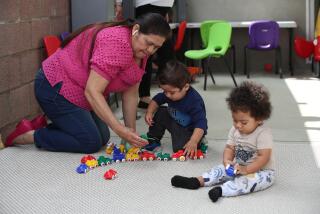Will Welfare Bill Break the Cycle of Poverty? : We Must Intervene Against Cruel Beginnings
- Share via
As welfare reform legislation approached its final hurdle, Sen. Daniel Patrick Moynihan (D-N.Y.) warned that if it was not enacted, “we will have spoiled the next century.” It was an understandable bit of hyperbole for one who had striven for two decades to fix “the welfare mess.”
But, whatever marginal effects the new law may have in attracting or coercing welfare recipients into employment, there is little chance that it will make any appreciable dent on the cycle of inter-generational poverty that threatens to create a permanent American underclass.
This is because the roots of long-term poverty go far deeper--beyond the reach of welfare reform. These roots will remain unreached in the absence of policies that create new jobs, ensure that full-time workers can earn enough to maintain a family, and that provide carefully crafted and well-supported job training for both men and women, whether or not they are welfare recipients. We need, in addition, to make available new kinds of services beginning early in the life cycle, long before failure and dependency become established.
The good news is that during the last two decades, research and innovative experiments have produced a body of knowledge on which we can confidently build to reconnect those mired in poverty with mainstream America. The new research shows that teen-age pregnancy and dropping out of high school frequently lead to welfare dependency and can be reliably predicted from poor school performance as early as third grade. Trouble at third grade, in turn, also has clear antecedents. It correlates with low weight at birth, untreated health problems, failure to develop secure and trusting relationships in the first few years, and lack of language and coping skills at school entry.
We know from programs that have documented their success that every one of these risk factors can be overcome. Sprinkled across the country, under both public and private auspices, are a variety of health, social service, family support, child care and preschool educational programs that have achieved long-term successes in changing the lives of disadvantaged youngsters and their families. The hard-won gains are measured in statistics showing decreased rates of low birth-weight babies, child abuse, school failure, early drop-out and teen-age child bearing--and increased rates of steady employment.
The programs that change the odds for even the most disadvantaged children have some clearly identifiable common elements:
--Successful programs are comprehensive and intensive. They deliver a wide range of services coherently, flexibly and ungrudgingly. They reflect the realization that quick fixes, cheap short cuts and isolated snippets of services are no match for the complex, deeply rooted tangles of troubles that beset overwhelmed families. Like the intensive medical care that enables frail babies and gravely ill adults to survive, intensive social supports help frail families to function.
--In successful programs, staff have the time, training and skills to build relationships of trust and respect with children and families. Leaders of successful programs uniformly emphasize the importance of relationships in providing services.
--Successful programs transcend long-standing professional and bureaucratic boundaries. They offer diverse services in nontraditional settings, including homes, and at nontraditional hours. Unlike prevailing programs bogged down in intricate efforts to keep out those who don’t meet rigid eligibility criteria, staff apply their ingenuity to getting people in.
What all this adds up to is the need for a new stance toward the provision of services and a new national commitment to build on recently accumulated knowledge and experience.
Such a national commitment would begin by fully funding those programs, like Head Start and the WIC (Women, Infants and Children) nutrition program, that already have proven effective on a national scale. A second step would involve identifying and reforming federal, state and local policies that now undermine valiant local efforts to provide coherent services.
Political leaders are shying away from new social programs in the face of budgetary pressures and an electorate still thought to be wary of major governmental intervention. But poll after poll shows that Americans are ready to invest in helping poor children and their families, and the leaders of American business have made it clear that we cannot afford not to make the investment.
With evidence that social intervention can reduce the number of children hurt by cruel beginnings, and simultaneously promote the national welfare, the nation must make use of the many tools now available to assure that the neglected children of today can become the contributing citizens of tomorrow. Then we may avoid spoiling the next century.
More to Read
Get the L.A. Times Politics newsletter
Deeply reported insights into legislation, politics and policy from Sacramento, Washington and beyond. In your inbox twice per week.
You may occasionally receive promotional content from the Los Angeles Times.










